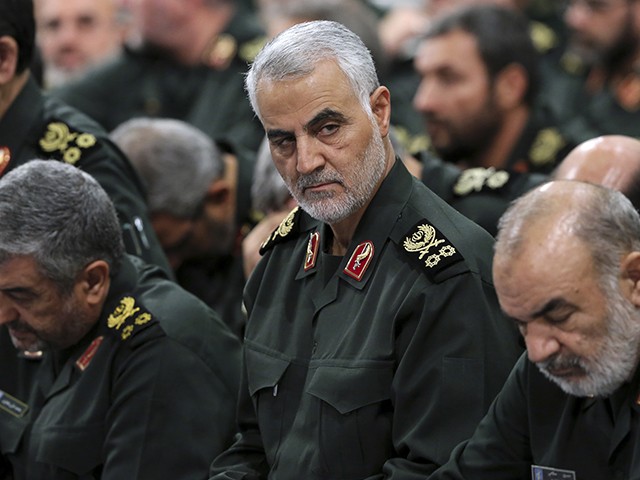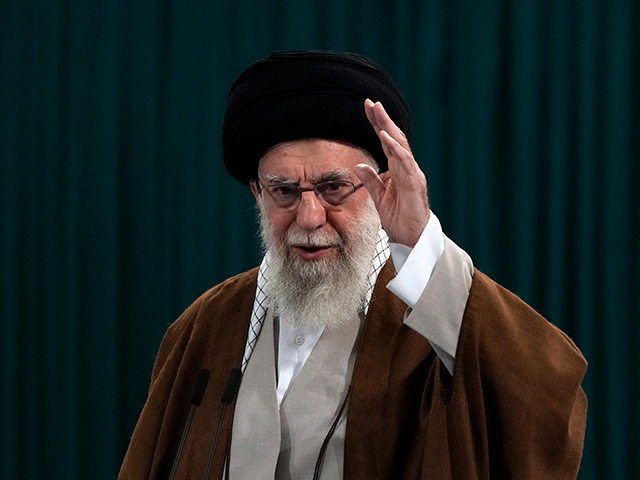The oppressive Iranian regime declared a five-day mourning period for President Ebrahim Raisi after his death in a helicopter crash on Sunday. However, many Iranians are celebrating the passing of the vicious hardliner, known as the “Butcher of Tehran” for his role in murdering dissidents after the 1979 Islamic revolution.
Iran International, staffed by opponents of the Iranian regime worldwide, reported dancing in the streets and celebratory fireworks in several Iranian cities even before Raisi’s death was officially confirmed:
“Let’s celebrate the good news of Ebrahim Raisi’s chopper crash,” a Tehran resident is heard saying in a video he sent to @IranIntl.pic.twitter.com/030e51bONv
— Iran International English (@IranIntl_En) May 19, 2024
“Let’s celebrate the good news of Ebrahim Raisi’s chopper crash,” a resident of Tehran said in a video smuggled out to Iran International.
Iranian women’s rights activist Masih Alinejad cheekily declared Sunday to be “World Helicopter Day” and joked it was “the only crash in history where everyone is worried if someone survived.” Raisi died alongside Foreign Minister Hossein Amirabdollahian and several other high-ranking officials.
Another dark jest circulating on the Internet was that Raisi’s aircraft was deliberately crashed by a saboteur working for Israel named “Eli Copter.” This joke rose into the Internet stratosphere when the genocidal Iran-backed terrorist group Hamas fell for it and cited the “report” as a true fact:
A new 🇱 national hero pic.twitter.com/y0df6IZxv0
— Ferdinando Iuliano 🇹 (@ferdinandoiu) May 19, 2024
Iranians living in exile celebrated Raisi’s death in cities such as London, where a dance party broke out in front of the Iranian embassy, and social media lit up with applause for Raisi’s ignominious end, especially from women whom his regime savagely oppressed:
Raisi presided over a brutal crackdown on the massive protests that erupted when a young Kurdish woman named Mahsa Amini was killed in September 2022 by Iran’s “morality police” for not wearing her mandatory headscarf correctly.
The Amini uprising, formally known as the “Women, Life, Freedom” protest after its chief slogan, was the biggest challenge to Iran’s cruel regime since it seized power in 1979, and only the harshest response enabled Raisi and the ayatollahs to remain in power. The regime is still killing people over the Amini uprising: only a few weeks ago, a man named Toomaj Salehi was executed for writing a rap song about Amini’s death.
Journalist and lawyer Jonathan Harounoff told Iran International that for many unhappy Iranians, Raisi has become emblematic of the deficiencies of their government, including “widespread bureaucratic corruption, woeful economic mismanagement, sky-high inflation, high unemployment,” as well as “tight censorship and severe punishment or death for political dissent.”
A 21-year-old Iranian student named Laila told Reuters in a phone interview on Monday she was not sad to see Raisi go, because he “ordered the crackdown on women for hijab,” but she was saddened by the thought that “even with Raisi’s death, this regime will not change.”
“Who cares? One hardliner dies, another takes over and our misery continues. We’re too busy with economic and social issues to worry about such news,” another weary Iranian agreed.
Reuters noted that Raisi’s passing was a “muted” affair, with “little of the emotional rhetoric that accompanied the deaths of publicly revered figures” such as Islamic Revolutionary Guard Corps (IRGC) terrorism mastermind Qassem Soleimani.
In this Sept. 18, 2016, file photo released by an official website of the office of the Iranian supreme leader, Revolutionary Guard Gen. Qassem Soleimani, center, attends a meeting in Tehran, Iran (Office of the Iranian Supreme Leader via AP, File).
The regime designated Soleimani a hero and martyr after he was killed by a U.S. airstrike in Baghdad in 2020 while in the midst of arranging terrorist attacks against Americans in Iraq. The Iranian government has commanded celebratory mourning of Soleimani every year since then, but many Iranians refuse to participate, and dissidents often express their contempt for the regime by defacing photos of the IRGC general.
Maryam Rajavi, president of the dissident National Council of Resistance of Iran (NCRI), hoped the cynics were wrong and Raisi’s death could deal a “monumental strategic blow to the mullahs, Supreme Leader Ali Khamenei, and the entire regime.”
“The curse of mothers and those seeking justice for the executed, along with the damnation of the Iranian people and history, mark the legacy of Ebrahim Raisi, the notorious perpetrator of the 1988 massacre of political prisoners,” Rajavi said on Monday.
The regime does not appear to be taking any chances. Iran’s Cyber Police issued a warning on Sunday that social media posts running contrary to mandatory “public emotions” – in other words, posts celebrating Raisi’s death – would be punished.
Several foreign media organizations noted an increased street presence by the IRGC after Raisi’s death was confirmed, suggesting the brutal theocratic wing of the Iranian military is ready to crack down on demonstrations that do not reflect the correct “public emotions.”
The official response to Raisi’s death might be somewhat muted because the regime has not yet decided whom to blame for the fatal helicopter crash and because Rajavi might be right about the damage to an already unstable government.
“This incident occurs against a backdrop of extremely high tensions in the region, which is already on edge due to the ongoing conflict in Gaza and recent military exchanges between Iran and Israel,” Center for International Policy Senior Fellow Sina Toossi noted.
“There is also growing rhetoric among Iranian officials about weaponizing the country’s nuclear program. Furthermore, the aging Supreme Leader Khamenei’s succession is a significant factor in Iran’s political landscape, compounded by a crisis of legitimacy facing the Islamic Republic,” he said.
Iranian Supreme Leader Ayatollah Ali Khamenei waves to media after he voted for the parliamentary runoff elections, in Tehran, Iran, Friday, May 10, 2024 (AP Photo/Vahid Salemi).
Toossi concluded that Raisi’s death could “contribute to an already volatile situation,” especially since he was seen as a leading candidate to become Supreme Leader after the ailing Khamenei’s death or retirement. In fact, the “Assembly of Experts,” which nominally “elects” the Supreme Leader, was scheduled to choose its chairman this week, and Raisi would almost certainly have gotten the nod.
Other observers wondered if the regime might decide to scapegoat Raisi for the many dismal domestic and foreign policy failures of the past few years, a strategy that would necessitate a much quieter funeral than the stage-managed hysterics over Soleimani’s death. Raisi was elected with a paltry share of the vote in a very low-turnout “election” farce in 2021; therefore, he has never enjoyed any sort of popular mandate, so his corpse would make an excellent political punching bag.
Ben Taleblu of the Foundation for the Defense of Democracies (FDD) said that while the Iranian regime is “quite content with the way the post-Oct. 7 Middle East has been shaking out,” the public is clearly unhappy, and the protest movement that surged after Amini’s death is “not dead.”
Taleblu said protesters have learned to “operate on the low level, on the periphery – usually strikes, labor unions, that kind of thing.”
“It could lead to a nationwide trigger, and it could be a nothing burger,” he said of Raisi’s death. “But the story of the Iranian protest movement is always a matter of when and not if.”






